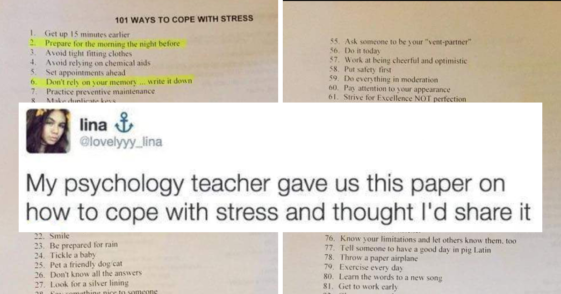A Teacher Shared This List Of 101 Ways To Cope With Stress And It’s Today’s Must-Read Internet
College (and all of life in general) can be an extremely stressful affair.
Depression, anxiety, and immense expectations can all get in the way of you enjoying your day to the fullest, and it’s difficult to cast those things aside, not to mention finding ways to cope with stress.

That’s why psychology teacher Brett Phillips has handed out his guide on handling stress and anxiety to his students for a decade.
It ranges from impactful decisions and activities such as exercise, cleaning your living space, and getting plenty of rest to random, spur-of-the-moment happy to-dos like petting a dog.
Student Alina Ramirez shared the list originally to her Facebook, where it quickly went viral.
“My psychology teacher gave us this paper on how to cope with stress and I thought I’d share it,” she wrote.


Here are all 101 tips:
1. Get up 15 minutes earlier
2. Prepare for the morning the night before
3. Avoid tight-fitting clothes
4. Avoid relying on chemical aids
5. Set appointments ahead
6. Don’t rely on your memory… write it down
7. Practice preventative maintenance
8. Make duplicate keys
9. Say “no” more often
10. Set priorities in your life
11. Avoid negative people
12. Use time wisely
13. Simplify meal times
14. Always make copies of important papers
15. Anticipate your needs
16. Repair anything that doesn’t work properly
17. Ask for help with the jobs you dislike
18. Break large tasks into bite-size portions
19. Look at problems as challenges
20. Look at challenges differently
21. Unclutter your life
22. Smile
23. Be prepared for rain
24. Tickle a baby
25. Pet a friendly dog/cat

26.Don’t know all the answers
27. Look for a silver lining
28. Say something nice to someone
29. Teach a kid to fly a kite
30. Walk in the rain
31. Schedule play time into every day
32. Take a bubble bath
33. Be aware of the decisions you make
34. Believe in yourself
35. Stop saying negative things to yourself
36. Visualize yourself winning
37. Develop your sense of humor
38. Stop thinking tomorrow will be a better day
39. Have goals for yourself
40. Dance a jig
41. Say “hello” to a stranger
42. Ask a friend for a hug
43. Look up at the stars
44. Practice breathing slowly
45. Learn to whistle a tune
46. Read a poem
47. Listen to a symphony
48. Watch a ballet
49. Read a story curled up in bed
50. Do a brand new thing

51. Stop a bad habit
52. Buy yourself a flower
53. Take time to smell the flowers
54. Find support from others
55. Ask someone to be your “vent-partner”
56. Do it today
57. Work at being cheerful and optimistic
58. Put safety first
59. Do everything in moderation
60. Pay attention to your appearance
61. Strive for excellence NOT perfection
62. Stretch your limits a little each day
63. Look at a work of art
64. Hum a jingle
65. Maintain your weight
66. Plant a tree
67. Feed the birds
68. Practice grace under pressure
69. Stand up and stretch
70. Always have a plan “B”
71. Learn a new doodle
72. Memorize a joke
73. Be responsible for your feelings
74. Learn to meet your own needs
75. Become a better listener

76. Know our own limitations and let others know them, too
77. Tell someone to have a good day in pig Latin
78. Throw a paper airplane
79. Exercise every day
80. Learn the words to a new song
81. Get to work early
82. Clean out one closet
83. Play patty cake with a toddler
84. Go on a picnic
85. Take a different route to work
86. Leave work early (with permission)
87. Put air freshener in your car
88. Watch a movie and eat popcorn
89. Write a note to a faraway friend
90. Go to a ball game and scream
91. Cook a meal and eat it by candlelight
92. Recognize the importance of unconditional love
93. Remember that stress is an attitude
94. Keep a journal
95. Practice a monster smile
96. Remember you always have options
97. Have a support network of people, places and things
98. Quit trying to fix other people
99. Get enough sleep
100. Talk less and listen more
101. Freely praise other people

Professor Phillips suggests students start off with just five things from the list to start seeing improvements in their mental health.
Which five will you tackle first?
More in Mental Health:

